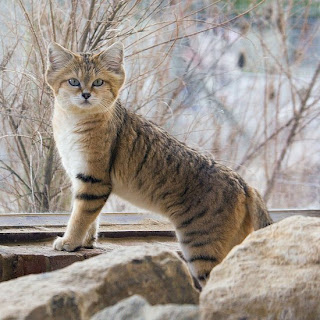Cats-Cats Unique Very Rare In The World
1. Pallas's Cat
Pallas's The Cat (Otocolobus manul) called "Manul". Only the size of a domestic cat, but seems more severe because of the dense fur. Pallas's The Cat is different from other cats in that it has big eyes and teeth and the gap a little more, giving the appearance of the face is relatively flat.
These cats ranged from Eastern Europe to Siberia, to explore a higher altitude than the Middle East and Asia. Cats are considered the oldest cat species, which evolved about 12 million years ago. Although cats are rarely found, you are probably familiar with this cat because popular images of a poster.
Pallas's The Cat (Otocolobus manul) called "Manul". Only the size of a domestic cat, but seems more severe because of the dense fur. Pallas's The Cat is different from other cats in that it has big eyes and teeth and the gap a little more, giving the appearance of the face is relatively flat.
These cats ranged from Eastern Europe to Siberia, to explore a higher altitude than the Middle East and Asia. Cats are considered the oldest cat species, which evolved about 12 million years ago. Although cats are rarely found, you are probably familiar with this cat because popular images of a poster.
2. Andean Mountain Cat
The Andean Mountain Cat (Leopardus jacobita) is very rarely seen, limited habitat in the mountains of Bolivia, Peru, Argentina, and Chile at an altitude above the tree line. Total population estimated at only around 2500. This cat is growing almost as big as a house cat, with long thick tail that could provide a useful counterweight to maneuver around the mountain.
The Andean Mountain Cat (Leopardus jacobita) is very rarely seen, limited habitat in the mountains of Bolivia, Peru, Argentina, and Chile at an altitude above the tree line. Total population estimated at only around 2500. This cat is growing almost as big as a house cat, with long thick tail that could provide a useful counterweight to maneuver around the mountain.

3.Margay
Margay (Leopardus wiedii) resemble domestic cats, but smaller than a house cat. Margay also have relatively longer legs than a house cat and is an excellent tree climber.
Cats are spread across the region stretching from Mexico down through Brazil. The species is in danger and is rarely seen, because only hunt at night and remain hidden in the rainforest.
 4. Fishing Cat
4. Fishing CatFishing Cat (Prionailurus viverrinus) there is in asia south and Southeast Asia, where he preferred to live near water is better for fishing, of course. He was the first swimmer from the family cat a cat. This cat is listed as endangered because their habitat is being destroyed as a wetland drained for human use.
5.Serval
Serval (Leptailurus serval) is one type of cat that long-legged African wildcat is believed to be an ancient ancestor of the lion and cheetah. These cats inhabit savannas of Africa. This cat has a small head and long legs are very efficient to catch prey. They are also very intelligent. Serval is a wild cat are most often kept as house pets.
6.Caracal
Caracal has a typical appearance of North America, this cat is growing well, and living in Africa and Asia. This cat grows about three feet long. Caracal prefer to live in mountain or desert areas, and can survive without water longer than other cats. Although rarely seen, there are a lot of caracal in the wild, and sometimes taken as pets.
7.African Golden Cat
African Golden Cat (Profelis aurata) is not always golden. In fact, the color varies greatly between individuals, ranging from reddish gold to dark gray with a special mark on several cats and a lighter chest. Cats also can change color during their life cycle. Golden Cat native living in the equatorial African rain forest. These cats are rarely seen, grows 30-32 inches long and weighing up to 40 pounds. Golden Cat animal classified as near threatened with extinction.
Cat 8.Sand
Sand cat (Felis margarita) lives in the deserts of Africa, Arabian Peninsula, and West Asia. same size as the domestic cat, but with a thicker fur. Sand the paint has a broad head and the hair grows in between the legs, the excess is often found in cats Arctic. The goal is to adapt the foot to the environment. This cat is listed as endangered animals, pemburuannya banned in many countries.

source: http://www.duniakita.info/2010/12/kucing-kucing-unik-yang-sangat-langka.html




